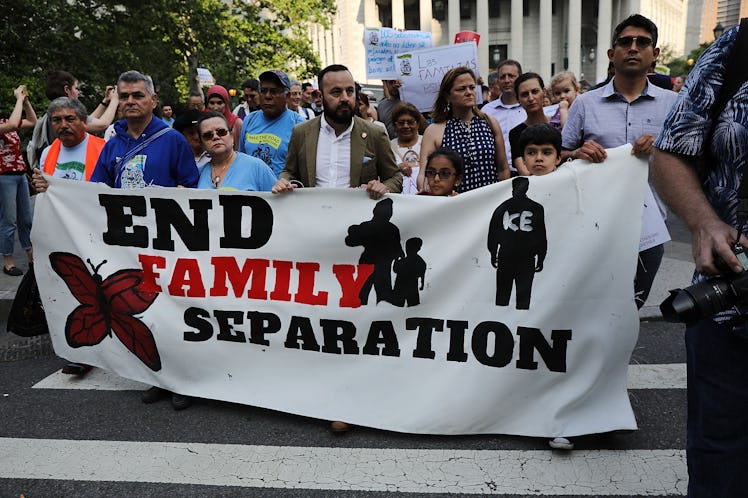
If You're Wondering About What To Do About The ICE Raids, Here's Some Info
On Thursday, July 11, The New York Times reported that U.S. Immigration and Customs Enforcement (ICE) will begin deportation raids on Sunday, July 14. An ICE spokesperson told Elite Daily by email that the agency couldn't confirm or offer specific details due to "law enforcement sensitivities" and the safety of ICE personnel. The controversial deportation efforts have been a point of alarm for many concerned citizens and immigration rights advocates across the nation. For those who want to get involved, here's what you can do if there are ICE raids in your community. Listen up, everyone.
According to The New York Times, ICE raids will begin on Sunday, July 14 and will last "multiple days" within 10 major cities in the United States. So far, the exact cities have yet to be revealed, but the Times reported that ICE plans to arrest at least 2,000 immigrants who have been ordered to deport, but still remain in the United States. In a statement to Elite Daily, an ICE spokesperson said that 90% of immigrants arrested by ICE in 2018 "had either a criminal conviction(s), pending criminal charge(s), were an ICE fugitive, or [had] illegally reentered the country after previously being removed." However, an anonymous ICE official told the Times that "authorities might detain immigrants who happened to be on the scene, even though they were not targets of the raids."
With these raids ahead, it's important for individuals and communities — immigrant or not — to know their rights in encounters with ICE agents. For example, according to tips from the American Civil Liberties Union (ACLU), individuals don't have to let ICE agents into their home unless officers have a warrant signed by a judge — per the ACLU sheet, a "warrant of removal/deportation (ICE warrant) does not allow officers to enter a home without consent."
The ACLU also notes that most people have the right to remain silent about their immigration status and where they were born (this doesn't apply at airports or international borders). If ICE agents have a valid warrant, individuals are allowed to remain silent, but if they choose to speak then they should step outside their home and close the door. If someone is stopped in a car or outside their home, they don't have to consent to a search, and should remember to ask the magic words: "Am I free to leave?"
For those taken into ICE custody, the ACLU states that immigrants have a right to a lawyer and should ask for a list of low-cost or free legal counsel, as the government is not obligated to provide one. A handout from the University of California, Berkley, also encourages all immigrants to read through papers given to them fully, and don't sign anything without talking to a lawyer. Individuals have the right to ask for an interpreter if they don't speak English. Above all, they should never discuss their immigration status with anyone except their lawyer.
What else to know? According to The Immigrant Defense Project, advocating for state and local funding to ensure immigrants have proper legal representation in court can make a big difference. Communities can also advocate for immigrant rights by supporting campaigns and policies that promote safe spaces for undocumented immigrants.
Even if these tips don't impact you directly, spreading the word and letting your neighbors know could make a world of difference.
We Have Rights, a campaign dedicated to assisting those who come in contact with ICE officials, drafted a sample emergency plan with information individuals can fill out, such as emergency contacts, social security numbers, and more. The document also has instructions about what to do with the emergency plan once it's filled out.
These ICE raids could seriously shake communities across the nation, and it can only help to be confident and know your rights. Even if these encounters don't directly impact you, read up on the issue and know how you can help. A little goes a long way.